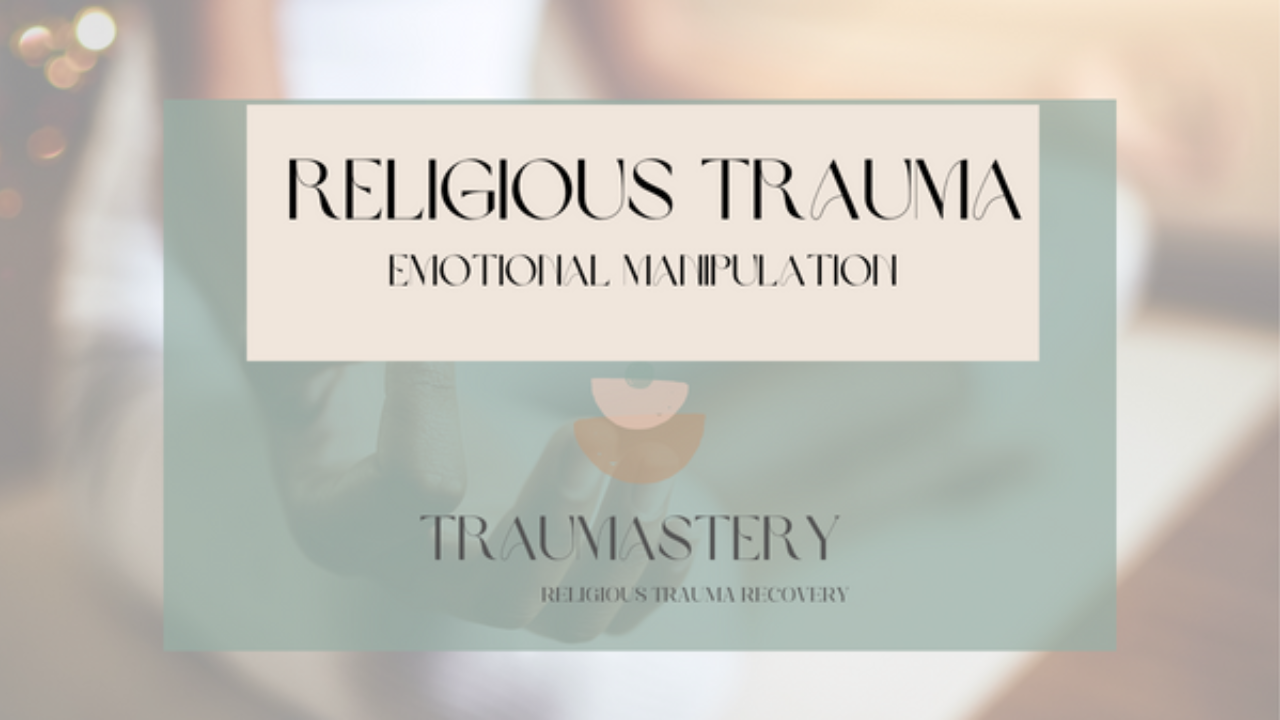Religious Trauma and Emotional Manipulation

Let’s talk about when church/religious communities become manipulative and abusive. Deborah Layton, a survivor of Jim Jone’s Peoples Temple said that “No one joins a cult. You join a self-help group, a religious movement, a political organization.” The same goes for religious communities. People join these communities because they are looking to connect to their faith and other people who share important beliefs.
Emotional manipulation can happen for any number of reasons: a problematic leader, a toxic positivity culture, an identity in more power, money, or members, etc. Emotional manipulation is especially sinister because it can occur subtly and slowly. Because of this, it can take time to realize that manipulation has occurred, or it may even be difficult to identify the manipulation until you have left the community.
Regardless of how these things happen (another whole post coming on that in the coming weeks), here’s the 𝘩𝘰𝘸 of emotional manipulation in religious communities.
𝗜𝗴𝗻𝗼𝗿𝗶𝗻𝗴 𝗽𝗲𝗿𝘀𝗼𝗻𝗮𝗹 𝗲𝘅𝗽𝗲𝗿𝗶𝗲𝗻𝗰𝗲𝘀 𝘁𝗼 𝘂𝗽𝗸𝗲𝗲𝗽 𝘁𝗵𝗲 𝗰𝗵𝘂𝗿𝗰𝗵 𝗶𝗺𝗮𝗴𝗲.
This can mean that when a painful experience is shared by one of the members, these experiences are ignored, explained away or the person is shamed for experiencing a negative emotion. Scripture, leadership, and “disappointment” from staff can all be used to shame a person.
Some ways that this might show up:
-
Pressuring individuals through religious texts to only focus on what is seen as positive (Philippians 4:8).
-
Telling individuals not to talk about their painful experience in a community or abuse perpetrated by a leader of a community because of “all of the good” that someone has done or will do in the future.
-
Snubbing people who talk about their painful experiences.
𝗦𝗰𝗿𝗶𝗽𝘁𝘂𝗿𝗲 𝗼𝗿 𝗿𝗲𝗹𝗶𝗴𝗶𝗼𝘂𝘀 𝘁𝗲𝘅𝘁𝘀 𝗮𝗿𝗲 𝘂𝘀𝗲𝗱 𝘁𝗼 𝘀𝗸𝗶𝗿𝘁 𝗮𝗰𝗰𝗼𝘂𝗻𝘁𝗮𝗯𝗶𝗹𝗶𝘁𝘆.
This usually means scripture is interpreted through a lens that is convenient to the manipulator and not the members. It can also give a leader too much power to be the “only interpreter” of the scripture, making the church community dependent upon their interpretations.
The concept of forgiveness immediately comes to mind when I think about this tactic. Far too often, when people within religious communities experience trauma or abuse, forgiveness is used to minimize or erase their experiences.
A few ways this might play out:
-
Survivors are pressured to forgive their abusers “because that's what Jesus would do” or “in order to be forgiven” (Matthew 6:14).
-
Abusers remain in positions of power or are appointed to new positions of power there is an expectation to “show people grace.”
-
Pressuring individuals to agree with the majority without complaining or arguing (Philippians 2:14).
-
Victim blaming- the abuse or manipulation occurred because of something the victim did, either directly in relation with the perpetrator, or a “past sin that they’re being punished for.”
These examples demonstrate how the experiences of abusers are prioritized, at the expense of accountability and protecting survivors.
𝗥𝗲𝗽𝗿𝗲𝘀𝘀𝗶𝗼𝗻 𝗼𝗳 𝘄𝗼𝗺e𝗻, LGBTQIA+ 𝗮𝗻𝗱 BIPOC.
When whole communities or “others” cannot contribute to the bigger conversation about ethics, leadership, or theology, there’s a big problem going on. This can lead to many issues but mostly it leads to upholding old power structures that have been painful, repressive, and downright traumatizing for entire groups of people.
Some ways that this plays out:
-
Groups of people, like women or LGBTQIA+ individuals, are explicitly prohibited from leadership roles.
-
For individuals with marginalized identities, like disabled individuals or BIPOC individuals, engaging with leadership and the communities at large can be isolating or even traumatizing to feel that your identities and experience are not considered or safe.
-
Resources and materials utilized by the community are created and written by individuals in power (like Bible studies and books written by cishet, white Americans).
-
Positions of power are appointed based on nepotism, leading to positions being filled by individuals with similar belief systems and ways of leading to current leaders.
When the experience of the majority (identities like cisgender, heterosexual, white, able-bodied, etc.) is prioritized, old power structures will be upheld and marginalized individuals will be traumatized.
Survivors: Emotional manipulation is no joke. If you are looking back at your religious or culty experience and thinking "Oh man, I was really manipulated for a very long time", then we have some options for helping you in your recovery. Join us for our curated religious trauma and cult abuse recovery membership for survivors. We do deep dives into emotional manipulation, how to spot it and how you can keep yourself safe in the future. Join us for A Year of Non-Magical Thinking here.
Therapists: Are you sitting with religious trauma or cult survivors and wondering how in the heck to help them navigate this recovery process? You are not alone. We have a curated training program for therapists just like you. We teach you all the ins and outs of cult abuse, emotional manipulation and religious trauma recovery and offer some personalized consultation into the mix as well. Join us for A Year of Non-Magical Thinking for Therapists today.


